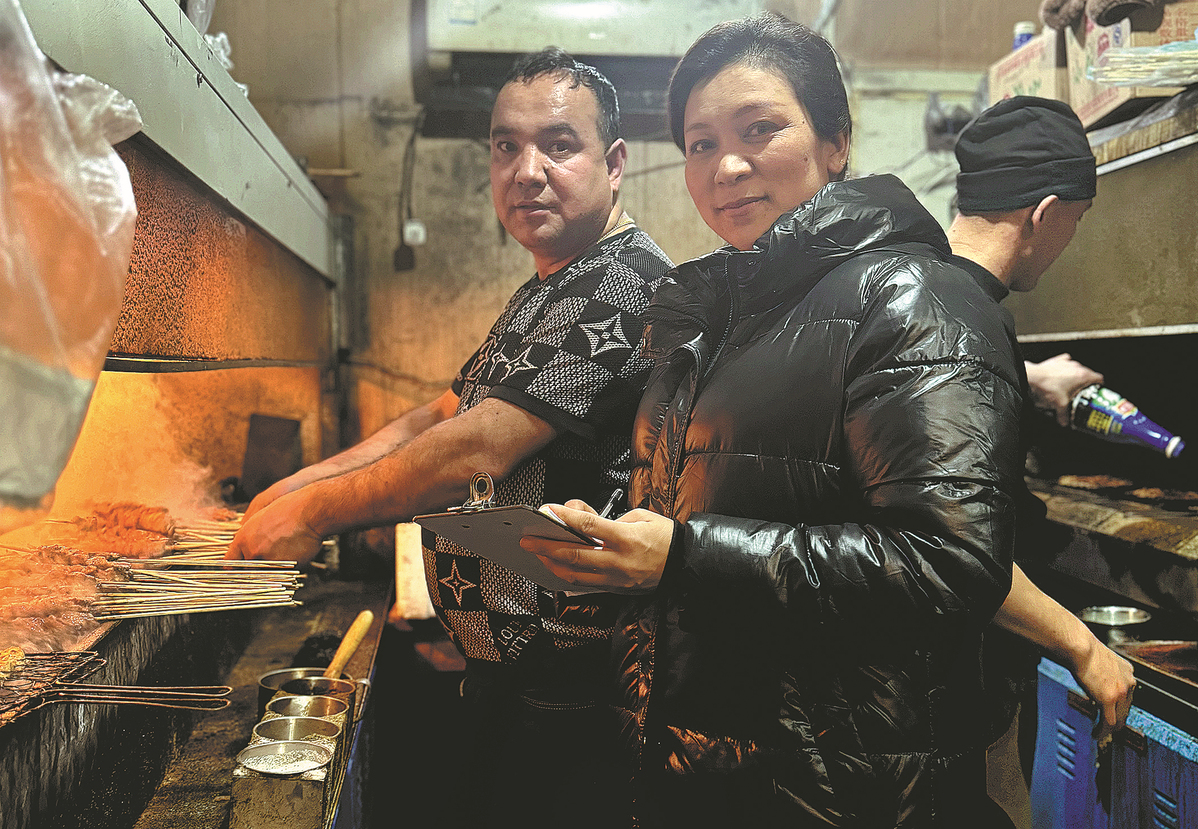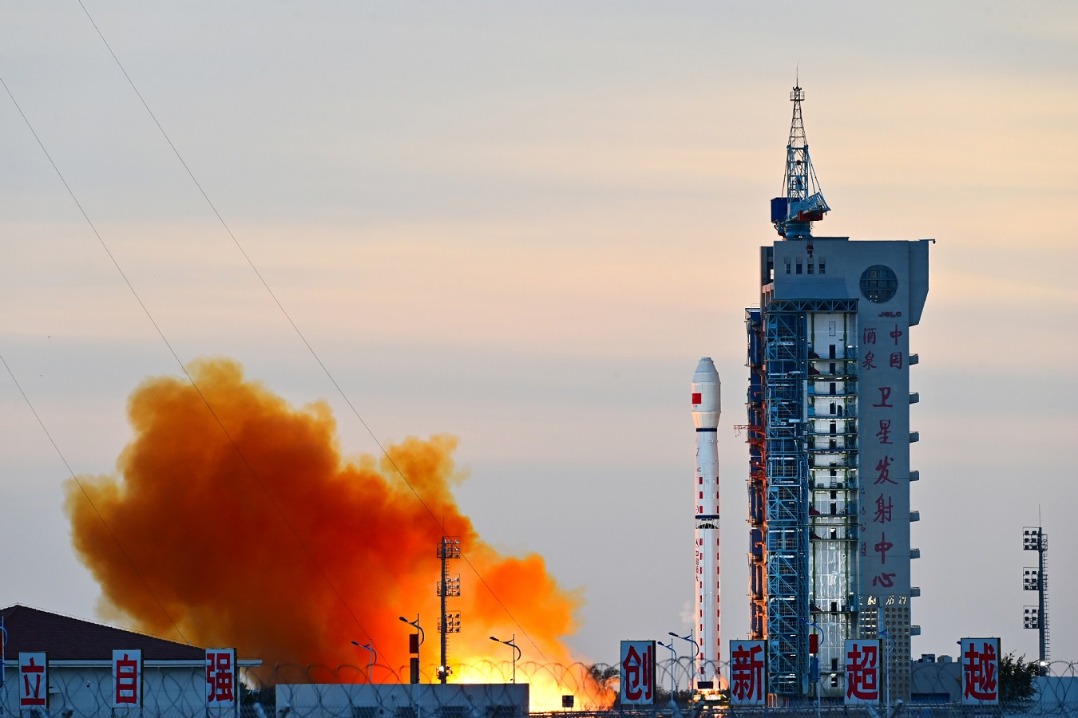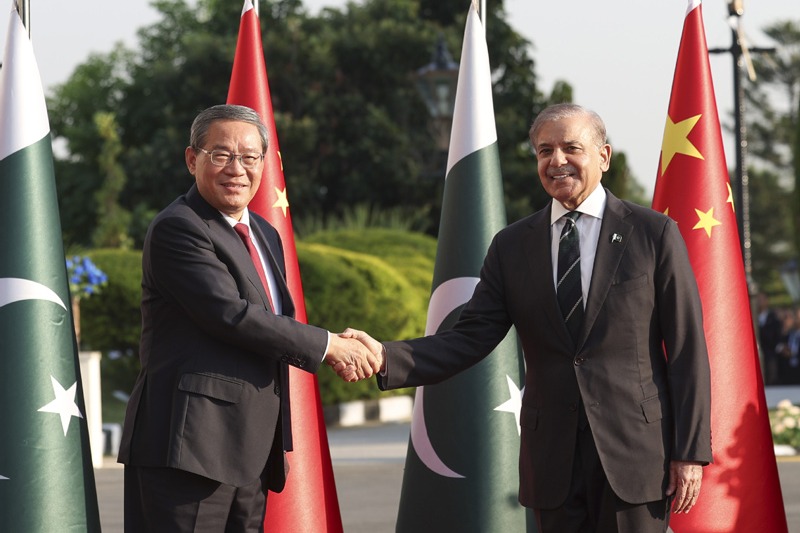Couple from Xinjiang bring rich flavors to Wuhan


At their barbecue restaurant in Wuhan, Hubei province, Guljamal Rozi serves customers while her husband, Amar Yusan, manages the grill. Smoke rises from the fiery red oven as he sprinkles cumin and chili powder on skewered lamb, which sizzles and sputters in its own hot juices.
The rich flavors of the Xinjiang Uygur autonomous region at the restaurant have attracted many loyal diners. Mutton skewer and nang bread are the most popular choices. Over the last 16 years, the couple, from Aksu, Xinjiang, have made a fortune in the city. "If it were not for the helpful and warmhearted neighbors from Wuhan, our business wouldn't be as successful as it is now," Rozi said.
Back in 2008, at age 22 and recently married, she came to work for her uncle in Wuhan, along with her husband. She was the firstborn in a farmer's family and has two younger sisters. "We were poor. We wanted to make more money," she said. It took the couple four days to travel to Wuhan by train, bringing nothing but an optimistic vision for the future.
When they arrived, they couldn't speak a word of Mandarin and couldn't understand customers' orders. They had to rely on Rozi's uncle and aunt to translate. It took her a year to comprehend much of anything in the language. She said her aunt, a longtime Wuhan resident, helped a lot. "The winter here is cold and summer is hot, and adapting to the climate has been quite challenging. My aunt taught me Mandarin and cooking skills, and she bought me clothes to help integrate me into the city," she added.
The couple earned 3,000 yuan ($423) a month with their barbecue. However, expenses climbed as their family grew. "We didn't save much money, to be honest," she said.
All three of their children are boys — now 15, 11 and 8 years of age. They all grew up in Wuhan and are fluent in Mandarin, and even can speak the Wuhan dialect. To save money, the couple needed to earn more. They decided to open their own restaurant in 2015. Two years later, their second restaurant opened, managed by her parents.
During peak times, from May to July and September to December, the food at the restaurant is in such high demand that long lines are commonplace. "Many people like our family and food. Some past customers who haven't visited for a while come back and give me a hug, saying,'Long time no see.' I like the people of Wuhan. They are very warm. The dishes in our restaurant are also reasonably priced," Rozi said.
Si Wen, a university student, was dining at the restaurant. She said she learned about it from classmates. "I come here often because their food is delicious. I always feel their enthusiasm." As the business expanded, the entrepreneurs needed more workers. They have hired 13 employees from Xinjiang.
"We do need help from others. On the other, I want to bring more villagers out to make money and see the bustling world outside," Guljamal Rozi said. Ablikim Mamat, 31, began to cook at the restaurant a year ago. He said he earns 3,000 yuan a month, with free food and accommodation. When he is not working, he goes out for entertainment. "I've been to the Yellow Crane Tower and the riverside, and I also enjoy going to bars. It's a lot of fun," he said. Rozi's husband Amar Yusan, 44, said, "Everyone says Xinjiang is great, but I say Wuhan is also great." When the restaurants were short of hands, the local government helped find workers. Rozi said the neighbors also helped the children learn Mandarin and would pick them up from school. "The people in Wuhan are really kindhearted," she said. The family now pays 2,500 yuan a month to rent a three-room apartment. They bought an apartment in Xinjiang in 2022, a car in Wuhan and plan to buy another three apartments there in the future.
Contact the writers at chenmeiling@chinadaily.com.cn
- Sixth World Buddhist Forum opens in Ningbo
- Tech sectors draw most overseas grads
- Former senior official of Southwest China's Guizhou arrested
- Xi, Mongolian President Khurelsukh exchange congratulations on 75th anniversary of diplomatic ties
- Shanghai clinic helps kids with low spatial, mathematics abilities
- Xi says China, US should serve as boost to each other's development




































